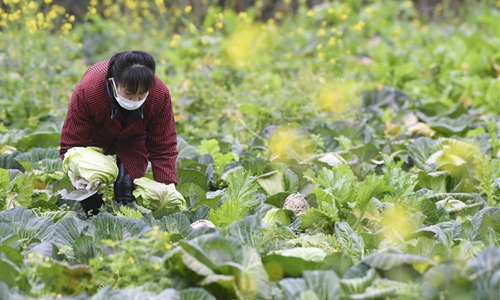HOME >> CHINA
Rural areas step up efforts against epidemic
By Wang Qi and Liu Caiyu Source:Globaltimes.cn Published: 2020/2/11 23:11:00

A worker harvests vegetables in a field in Matuo village of Yunyang county in Southwest China's Chongqing, Feb 5, 2020. Photo: Xinhua/Wang Quanchao
Villages in China should strengthen efforts to guide farmers to conduct spring plowing work properly and push the toilet revolution to maintain hygiene in villages, which is critical to controlling the coronavirus epidemic, China's Ministry of Agriculture and Rural Affairs (MARA) said on Tuesday.
Experts and officials reached by the Global Times said the outbreak won't affect farmers' spring plowing, but the shortage of medical resources and lack of preventive awareness might hinder epidemic control.
Officials said at a press conference on Tuesday that farmers will be guided properly in this year's spring plowing work on the premise of fully protection. Massive gatherings will be avoided and the off-peak mode will be encouraged.
He Xuefeng, director of the China Rural Governance Research Center at the Wuhan University, told the Global Times that the epidemic has yet to create a huge impact on farmers because February is only the time when most farmers make preparations for plowing and sowing. Most regions in China will not start harvesting until March.
Luo Yameng, a Beijing-based urban and rural management expert, told the Global Times on Tuesday that the epidemic would benefit this year's spring plowing as a lot of young and middle-aged laborers were stopped from going out to cities to work. They will stay in their rural hometowns.
Epidemic control in rural areas faces various difficulties such as limited medical resources, lack of preventive awareness, and the habit of frequently visiting relatives, the Ministry of Agriculture and Rural Affairs said on Tuesday at the press conference.
To address the problems, the ministry said the allocation of medical and sanitary supplies will consider rural areas. China has 1.44 million village doctors, which could cover the needs of epidemic prevention. China is enhancing the training and guiding for rural doctors to improve their medical capacity and working efficiency, according to the press conference.
The Chinese government will intensify publicity like initiative letters, on television, radio and new media to strengthen the popularization of health and hygiene in villages, the ministry said.
He Bin, an official at the ministry, noted the efforts in pushing the "toilet revolution" in rural areas, which is critical to epidemic control. He said that by the end of the year, the transformation and rectification of rural household toilets will be completed in East China and some places in the middle and west of the country.
The toilet revolution is a long-term job of local officials in villages. The open dry pail latrine in residential house in the township will be replaced by water closets, which maintains hygiene and curbs the spread of coronavirus through feces, Hu Bin, an official from Heguo township, North China's Hebei Province, told the Global Times.
Experts had warned that the novel coronavirus could be transmitted through the digestive system as they found 2019-nCoV nucleic acids in patients' stools.
The MARA is also conducting village-cleaning operations by strengthening the management of livestock and poultry breeding as well as waste water discharging, guiding residents to clean their living environment.
Similar to big cities, where residential communities are locked down, the measure to curb the spread of the virus, such as closing off villages and main roads, has also been rolled out in rural areas in provinces like Henan, Guizhou, and Guangxi Zhuang Autonomous Region.
"To minimize the residents' travel frequency, our villages have also dispatched teams to purchase and deliver goods door-to-door for villagers," Hu Bin said.
Posted in: SOCIETY